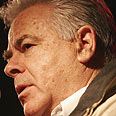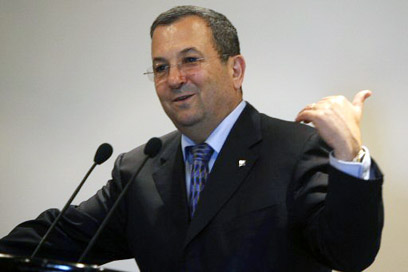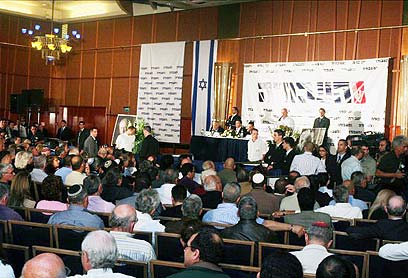
Tired of the sidelines
Ephraim Sneh has had enough. Enough of Ehud Barak's antics, enough of Labor's lingering on the political sideline, enough of the Left's procrastinating on the peace process. It's time for a change, he says, and he is just the man for the job
Knesset Member Ephraim Sneh can hardly be called naïve; but still, after 20-odd years in Labor, after acquiring a formidable parliament record and holding ministerial positions in several governments, Sneh – an old fashion politician – decided to leave his political home and strike out on his own.
At 64, Sneh is convinced he can introduce Israel to a new political power and build a strong new camp before the next general elections. Enter Strong Israel.
A closer look at the decision to embark on a new political adventure reveals certain signs of despair - not a favorable mood in Labor these days. The party's demise seems to be looming, it is consistently dropping in the polls, old-time supporters have all of a sudden developed the proverbial wandering eye, and party Chairman Ehud Barak, is – how should we put it gently – doing very well. Even with Kadima on a slippery slope as far as public support is concerned, Barak still seems unable to bring the voters back home. Sneh just doesn't want to be there anymore.
A known political rival of Barak's, Sneh – who had consistently avoided any personal attacks of the Labor chief – is the first prominent Labor figure to call it quits. Unlike the Pensioners' Party members, who rattled the political arena with their inner spilt, which resulted in a temporarily-halted political agreement with Arcadi Gaydamak's Social Justice Party, MK Sneh has decided to give his Knesset membership back to the party and stepped down, in what was already described as a rare move in the Israeli political scene.
"My Knesset seat is not my own, it belongs to Labor, which I no longer represent," he said.

Announcing resignation, new party (Photo: Ofer Amram)
Wanted: A will to lead
Sneh is convinced he has what it takes to be elected to the Knesset on his own merit, as part of a new party, which for now consists of just him. He is well aware that his break from Labor may spell the end of his political career. He has no funding, no billionaire sponsor and his way to the public's heart and votes – through what can only be described as a sea of political parties, movements and other ephemeral forces – is unsure, at best.
"I wish I could spend the next 20 years in Labor," he said. "Unfortunately, and you can’t begin to imagine how sad I am to say this, Labor has lost the will to lead and replaced it with the wish to just be a part of government.
"I've spent the last couple of months trying to see if I can change that and found that there was no longer any energy left in the party. The political culture of the party has gone bad."
Is it safe to assume Barak's leadership had something to do with that?
"My decision to leave had nothing to do with personal affronts or matters of respect. I know Barak's people want to color my move as motivated by some insult, but I won’t play that game.
"I truly believe it is time for a new 'big bang' in the Left. I've been talking about this need for two years, since before Amir Peretz named me deputy defense minister. I'm not pursuing the hard, complex avenue of starting a new political party over an insult."
Ode to red tape
An Internal Medicine specialist, Ephraim Sneh MD joined Labor in 1988. He decided to pursue statesmanship after a long career in the IDF. Brigadier –General Sneh's last position was as deputy head of the Civil Administration in the West Bank. He was hailed as someone who contributed greatly to easing the lives of the Palestinian population in the area.
Sneh's first political bid came in 1992, when he ran for Knesset under former Prime Minister Yitzhak Rabin. "There has not been another like him. I haven't followed any other leader since November 4, 1995 (date of Rabin's assassination)," he said. He served two tenures as deputy defense minister, one as transportation minister and one as the health minister. Around that time he made a bid for Labor leadership, but failed. Party members apparently found him less than vivacious.
Labor Chairman Ehud Barak was a major catalyst in his decision to part ways with the party. Sneh sees Barak as less than conducive to the peace process, and says Barak has been known to throw the occasional curve ball in order to hinder it. He also has a personal bone to pick with the man, for ousting him from the position of deputy defense minister after he voiced his support for Amir Peretz in the last Labor primaries.
Since the rift between the two, Sneh has spent most of his time trying to push new initiatives in the Israel-Palestinian peace process, but says he was stonewalled more often than not.
Some of your Labor counterparts believe that Barak is now somewhat to the right of Likud leader Benjamin Netanyahu. Do you agree?
"Yes I do. We cannot afford to stand on the sideline when in comes to the Israel-Palestinian peace process. The defense minister wheels a huge amount of clout over what goes on in the territories and he should harness that both for the good of process and for the good of the Palestinian people. Barak is barely using that clout. We do not send out a message stating we want a viable peace process. Barak isn't interested in helping the Palestinians. He oozes disbelief in the process. I told him more than once – 'you can't sit by and watch, you have to be the one pushing the move. You, not (Prime Minister Ehud) Olmert.'"

Doing nothing to rejuvenate Labor? Barak (Photo: Reuters)
Barak, he added, has positioned himself in the political right, a far cry from his natural position as the leader of the peace camp. "Unfortunately, Barak is not leading the peace camp anywhere. Olmert is doing the right thing, pushing the peace process with Palestinian President Mahmoud Abbas. Olmert has shifted gears since the summer of 2007, and is focusing on what needs to be done, but Barak isn't. I've asked Labor to hold a session on the expansion of settlements, but Barak gave me the runaround."
Amir Peretz claims that Barak is hindering the peace process because he can't stand the thought of someone else succeeding where he failed.
"That's venturing into psychology . I want to deal with politics. I think Barak doesn't believe we have any chance of striking peace with the Palestinians."
Fragments of ideology
According to Sneh, it was fragmented ideology that prompted him to break from Labor; but despite no real confirmation on his part, it is clear that personal disillusion, bitterness and the humiliation he suffered after being ousted from the deputy defense minister position, played a part in his decision.
"The negative undercurrents in Labor date to before Barak's time," he said, "but Barak is doing nothing to stop them. He should have initiated rejuvenating moves; he should have worked towards closing the ranks, and he didn't. Labor has lost the passion to make a difference, to change reality."
The way Sneh was ousted form the position of deputy defense minister can be considered, in a way, a testimony to the way politics is run in Israel: True, his was a politically-motivated appointment by Peretz, but everyone in Labor agreed he was the right man for the job. Once Barak was voted Labor chief and fired Peretz via fax – yes, via fax – he was only two weeks away from giving Sneh the ax and naming MK Matan Vilnai deputy defense minister.
"I met with Barak and asked him why he decided to have me replaced. He told me that the only consideration was that of professional merit. I was the number-one man for the job, but since the political consideration in the only thing that counts when in comes to choosing the deputy defense minister, I'm only third in line – after Matan Vilnai and Danny Yatom," said Sneh.
How did you take that?
"I internalized the principle."
In December 2007 Sneh sent Olmert and Barak a confidential, eyes-only memorandum about Gaza, based on military intelligence. A short while thereafter Olmert sent him a lengthy reply. Barak didn't even bother.
In June of 2007, when Amir Peretz made his bid for Labor leadership, Sneh was one of his few outspoken supporters. Even when it was clear that he failed, Sneh is still convinced Peretz was wronged - a victim of the media and public stereotypes: "I had an extraordinary working relationship with him. I had a free hand and the backup I needed, as well as an exemplary friendship."
When asked what he thought of the ridiculous portrayal of Peretz on Israeli satire shows, he is adamant in his reply: "(Peretz) was portrayed in a racist, obnoxious way. And that's an understatement."

Lost political way. Labor convention (Archive photo: Ofer Amram)
Labor decided to replace Peretz both as party leader and defense minister very quickly. What's wrong with the party's DNA, that it is so quick to change leadership?
"It's not in our DNA, it's in our culture. Labor has gone through seven leaders in the past 10 years. That's the political culture we have. I met with a Swedish Labor figure a while back, and she told me: 'You know what the difference between us is? You've changed seven leaders in 10 years. We've changed 10 leaders in 108 years.'"
What's in a name?
Sneh's name of choice for his party – Strong Israel – did not come about randomly. It was modeled after Rabin's famous slogan "Israel is strong with Rabin." He also has a core, four-point platform: Israel as a welfare state – meaning the State, and not philanthropists, would be in charge of taking care of the citizens' welfare; boosting Israel's military supremacy, particularly where the Iranian threat is concerned; pushing towards an end to the Israeli-Palestinian conflict, based on the two-state solution; and boosting environmental conservation.
Right now, he still stands alone. None of his friends in Labor have joined him yet, he has no partners and no funding. Come election time, will his new party be able to cross the electoral threshold? Sneh has no doubt. The political arena, however, does.
Nevertheless, there were no obvious signs of relief among Labor members once Sneh made the announcement. On the contrary - even his political rival admitted that "the party has lost a seasoned, serious politician and a true democrat."
Was this move naïve? Pretentious?
"Some may call it pretentious. Many have told me it's a brave move."
In your opinion, who is the leading candidate for premiership today?
"I am. When you see the array of candidates out there, I can safely say I am inferior to none; not when it comes to political, security and ministerial experience, and certainly not when it comes to setting a personal example."
- Stay focused










